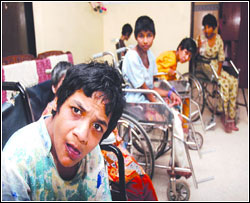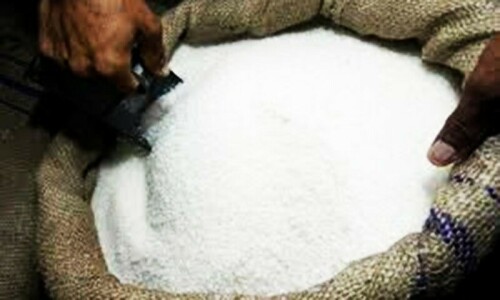 KARACHI: Mentally-challenged people are found in all parts of the world. They cannot adjust in society, nor can they be taken care of properly at home. However, particularly in Pakistan, parents who are not in a sound financial position to manage the difficult task of bringing up children who are not considered “normal,” usually abandon them.
KARACHI: Mentally-challenged people are found in all parts of the world. They cannot adjust in society, nor can they be taken care of properly at home. However, particularly in Pakistan, parents who are not in a sound financial position to manage the difficult task of bringing up children who are not considered “normal,” usually abandon them.
Darul Sukun is an abode for children and adults alike that are rejected by society and their families because of a deformity or being mentally-challenged. With four of its branches spread across the city, the one at Kashmir Road has almost 150 people who need to be fed, cleaned, and given proper attention.
Founded in 1969 by Sister Gertrude Lemmens, the centre works day and night for the noble cause. The three-storied building has clean and well-lit rooms as well as recreation facilities for those who live there. A physiotherapy room, snoozer’s room, and electrotherapy rooms are some of the basic features of the centre.
Sandra is one of the 53 staff members of the centre, including five sisters. She patiently takes care of the women who are under her supervision. Unaware of their own physical growth many of the women need to be nursed in every possible way.
“I and my co-workers get them all cleaned up first thing in the morning and then give them breakfast at 7.30 am,” she says. “Some of the girls who are somewhat sensible manage and at times help others to do what is needed, but otherwise we have to manage the whole day on our own,” Sandra adds.
Cookie, an 18-year-old girl, dressed in a white trouser and T-shirt, is a student at Saint Patrick’s High School. She will be matriculating soon. She was brought here while still a child. Her bald head, slits for eyes, strange holes to make up for a nose, and queer nasal voice hasn’t shattered her at all. These too were gained after a series of operations that took place in Australia.
No one will be able to tell that this smart girl, abandoned while she was an infant for her deformity, can be so “normal.”
“She asks smart questions to the sisters about her parents and where she has come from. But they tell her that she was so much liked by them that they have kept her for themselves,” says Morris Khurshid, the office manager.
“I am good at studies and will be matriculating soon. I use the computer to check my emails and teach children at the centre,” she says in a polite yet confident manner. “I teach the children here to draw and make better use of their time,” she adds. Cookie, whose real name is Maria, roams around the place as if it was her own home.
Alamin, on the other hand, is much more reserved and does not want to talk. Conscious of the fact that earlier on people used to be scared of the terrible burn marks on him, he rarely talks. He and his father barely survived a fire that broke out and killed many of his family members. He was handed over to the centre by the father, not knowing what to do with him.
“He has had seven surgeries so far. He is a pretty bright kid. He helps me in the office as well,” informs Morris.
While surveying various rooms of the centre, this writer came across many elderly women who acted as if they were girls of age eight or nine. One of them, Clara, is in her sixties. She shakes hands with everyone and asks with a joy-filled voice, “Would you like me to hear me sing, aunty? My name is Clara.”
The slightest approval by the visitor can make her break into song. Saba, standing close to her, is then gestured by her to sing. She readily joins in. However, Saba is more active physically and takes part in the Special Olympics as a swimmer.
Morris, who has been associated with Darul Sukun since 2000, talks about the attitude of family members towards the inmates of the centre: “After leaving their relations here, the family members seem to forget about them and rarely visit them.”
He adds that people often give the wrong address and phoney contact numbers so that the centre cannot reach them.
He feels that it is a very difficult job and can only be done if one is motivated to do it.
“It is a tiring yet very satisfying job. But you have to understand that after living with these mentally-challenged people day in and day out, I think I am not normal myself anymore,” he discloses.














































